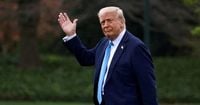In a surprising turn of events, U.S. President Donald Trump has reignited speculation about a potential third presidential term, stating emphatically that he is "not joking" about the idea. This assertion, made during an interview with NBC News on March 30, 2025, raises significant constitutional questions, as the U.S. Constitution explicitly prohibits any individual from being elected to the presidency more than twice, a rule established by the 22nd Amendment.
Trump's comments come as he serves his second term, which is non-consecutive, having initially taken office on January 20, 2017. In the NBC interview, he stated, "There are methods which you could do it, as you know," although he declined to elaborate on what those methods might entail. His remarks signal a clear shift from previous statements where he indicated he was joking about the possibility of seeking a third term.
The 22nd Amendment, ratified in 1951, clearly states that "no person shall be elected to the office of the president more than twice." This provision was largely a response to Franklin D. Roosevelt’s unprecedented four-term presidency, which began in 1933 and ended with his death in 1945. Historically, George Washington set the two-term precedent in 1796, a practice followed by most presidents until Roosevelt broke the mold.
Trump, now 78 years old, would be 82 if he were to run again after the 2028 election. His comments have sparked outrage among political opponents, with Ken Martin, chair of the Democratic National Committee, condemning the remarks on social media, stating, "This is what dictators do. In three months, Trump has crashed the stock market and spiked costs. Now, he's scheming for a third term instead of doing anything to make Americans' lives better." Martin's comments reflect a growing concern among Democrats regarding Trump’s intentions and the implications for American democracy.
Adding to the conversation, longtime Trump ally Steve Bannon expressed confidence in a potential Trump run in 2028 during a March 19 interview with NewsNation. Bannon suggested that he and others are exploring ways to facilitate Trump's return to the White House, including examining the definition of term limits. He stated, "We're working on it," further fueling speculation about Trump's future political ambitions.
When asked about a scenario involving U.S. Vice President JD Vance running for president and then passing the baton to him, Trump replied, "Well, that’s one. But there are others too," without providing further details. This statement has left many wondering about the potential strategies that might be considered to circumvent the constitutional restrictions.
Legal experts, however, have been quick to dismiss Trump's assertions. Derek Muller, an election law professor at Notre Dame, stated, "I don’t think there’s any ‘one weird trick’ to getting around presidential term limits." Muller highlighted the additional constraints posed by the 12th Amendment, which would render Trump ineligible to run for the vice presidency after completing his second term.
As the political landscape continues to evolve, Trump's comments on a possible third term are likely to remain a focal point of discussion. With the presidential election cycle heating up, the implications of his statements could have far-reaching effects on both his party and the broader electorate.
In light of his recent remarks, Trump has also reiterated his belief that the 2020 election was "totally rigged," suggesting that he has garnered significant support for a third term, which he refers to as a fourth term due to his claims regarding the previous election. He stated, "I have had more people ask me to have a third term." This rhetoric not only reflects his ongoing grievances about the 2020 election but also highlights the persistent divisions within the American political landscape.
As discussions about Trump's potential third term unfold, the response from both his supporters and detractors will be crucial in shaping the narrative. The legal and constitutional challenges that would arise from such a bid are manifold, and the prospect of overturning the 22nd Amendment would require a monumental political effort, including a two-thirds vote in both houses of Congress and ratification by three-fourths of the state legislatures.
In conclusion, Trump's recent comments about seeking a third presidential term have reignited debates about constitutional limitations and the future of American democracy. As the 2028 election approaches, it remains to be seen how these discussions will influence the political landscape and the electorate's response to Trump's continued ambitions.





